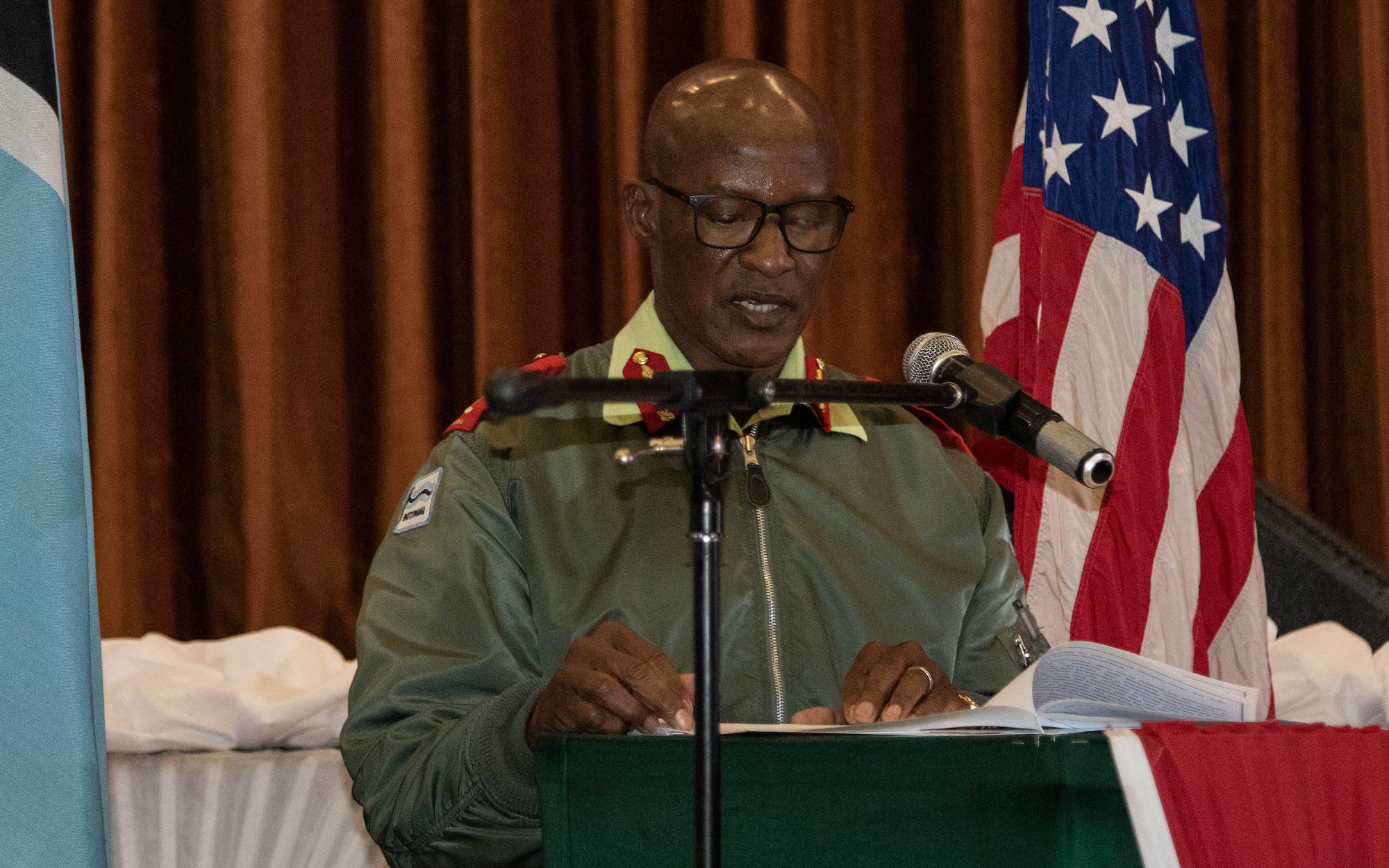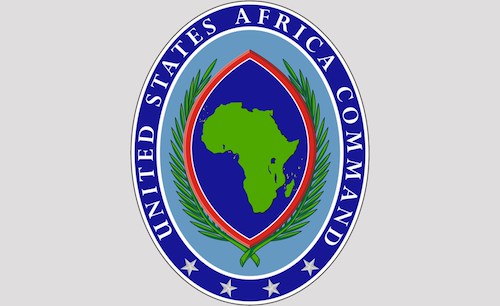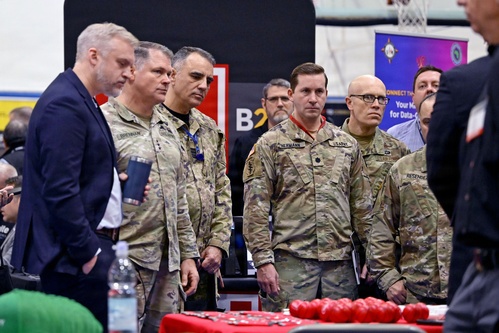Gallery contains 10 images
×
Photo 1 of 10
U.S. Army Southern European Task
Botswana Defence Force Maj. Gen. Joseph Eno Seelo, deputy commander of the BDF, provides remarks during the opening ceremony of exercise Southern Accord 2024 in Gaborone, Botswana, Aug. 5, 2024. Southern Accord 2024 is a bi-annual joint exercise sponsored by U.S. Africa Command and led by U.S. Army Southern European Task Force, Africa (SETAF-AF). Running from Aug. 5-15, the exercise brings together U.S. Army and Air Force personnel and Botswana Defence Force counterparts to conduct a variety of training to include humanitarian assistance, disaster relief, as well as peacekeeping and aeromedical evacuation. The exercise is designed to enhance bilateral military capabilities and interoperability. (U.S. Army photo by Maj. Joe Legros)
Photo by: Maj. Joe Legros
Photo 2 of 10
U.S. Army Southern European Task
Botswana Defence Force Lance Cpl. Malebogo Mojaeti, an aircraft mechanic, and U.S. Air Force Senior Master Sgt. Jerri Edwards, bilateral affairs noncommissioned officer at U.S. Embassy Gaborone, pose for a photo during the opening ceremony of exercise Southern Accord 2024 in Gaborone, Botswana, Aug. 5, 2024. Southern Accord 2024 is a bi-annual joint exercise sponsored by U.S. Africa Command and led by U.S. Army Southern European Task Force, Africa (SETAF-AF). Running from Aug. 5-15, the exercise brings together U.S. Army and Air Force personnel and Botswana Defence Force counterparts to conduct a variety of training to include humanitarian assistance, disaster relief, as well as peacekeeping and aeromedical evacuation. The exercise is designed to enhance bilateral military capabilities and interoperability. (U.S. Army photo by Maj. Joe Legros)
Photo by: Maj. Joe Legros
Photo 3 of 10
U.S. Army Southern European Task
U.S. Army Col. Mark Whiteman, senior defense official and defense attaché with U.S. Embassy Gaborone, provides remarks during the opening ceremony of exercise Southern Accord 2024 in Gaborone, Botswana, Aug. 5, 2024. Southern Accord 2024 is a bi-annual joint exercise sponsored by U.S. Africa Command and led by U.S. Army Southern European Task Force, Africa (SETAF-AF). Running from Aug. 5-15, the exercise brings together U.S. Army and Air Force personnel and Botswana Defence Force counterparts to conduct a variety of training to include humanitarian assistance, disaster relief, and peacekeeping and aeromedical evacuation. The exercise is designed to enhance bilateral military capabilities and interoperability. (U.S. Army photo by Maj. Richard Dickson)
Photo by: Maj. Richard Dickson
Photo 4 of 10
U.S. Army Southern European Task
Seth Henderson, lead exercise planner for Southern Accord 2024, U.S. Army Southern European Task Force, Africa (SETAF-AF), sits with Botswana Defence Force partners during the opening ceremony of the exercise in Gaborone, Botswana, Aug. 5, 2024. Southern Accord 2024 is a bi-annual joint exercise sponsored by U.S. Africa Command and led by SETAF-AF. Running from Aug. 5-15, the exercise brings together U.S. Army and Air Force personnel and Botswana Defence Force counterparts to conduct a variety of training to include humanitarian assistance, disaster relief, as well as peacekeeping and aeromedical evacuation. The exercise is designed to enhance bilateral military capabilities and interoperability. (U.S. Army photo by Maj. Joe Legros)
Photo by: Maj. Joe Legros
Photo 5 of 10
U.S. Army Southern European Task
Botswana Defence Force Col. David Nkete, lead exercise planner with the BDF, provides remarks during the opening ceremony of exercise Southern Accord 2024 in Gaborone, Botswana, Aug. 5, 2024. Southern Accord 2024 is a bi-annual joint exercise sponsored by U.S. Africa Command and led by U.S. Army Southern European Task Force, Africa (SETAF-AF). Running from Aug. 5-15, the exercise brings together U.S. Army and Air Force personnel and Botswana Defence Force counterparts to conduct a variety of training to include humanitarian assistance, disaster relief, and peacekeeping and aeromedical evacuation. The exercise is designed to enhance bilateral military capabilities and interoperability. (U.S. Army photo by Maj. Richard Dickson)
Photo by: Maj. Richard Dickson
Photo 6 of 10
U.S. Army Southern European Task
U.S. and Botswana participants in exercise Southern Accord 2024 pose for a group photo during the opening ceremony in Gaborone, Botswana, Aug. 5, 2024. Southern Accord 2024 is a bi-annual joint exercise sponsored by U.S. Africa Command and led by U.S. Army Southern European Task Force, Africa (SETAF-AF). Running from Aug. 5-15, the exercise brings together U.S. Army and Air Force personnel and Botswana Defence Force counterparts to conduct a variety of training to include humanitarian assistance, disaster relief, as well as peacekeeping and aeromedical evacuation. The exercise is designed to enhance bilateral military capabilities and interoperability. (U.S. Army photo by Maj. Richard Dickson)
Photo by: Maj. Richard Dickson
Photo 7 of 10
U.S. Army Southern European Task
U.S. Army Col. Mark Whiteman, senior defense official and defense attaché with U.S. Embassy Gaborone, speaks with U.S. Army Lt. Col. Jason Porter, deputy chief of exercises (G7), U.S. Army Southern European Task Force, Africa (SETAF-AF), during the opening ceremony of the exercise in Gaborone, Botswana, Aug. 5, 2024. Southern Accord 2024 is a bi-annual joint exercise sponsored by U.S. Africa Command and led by SETAF-AF. Running from Aug. 5-15, the exercise brings together U.S. Army and Air Force personnel and Botswana Defence Force counterparts to conduct a variety of training to include humanitarian assistance, disaster relief, as well as peacekeeping and aeromedical evacuation. The exercise is designed to enhance bilateral military capabilities and interoperability. (U.S. Army photo by Maj. Joe Legros)
Photo by: Maj. Joe Legros
Photo 8 of 10
U.S. Army Southern European Task
Botswana Defence Force Col. David Nkete, lead exercise planner with the BDF, and U.S. Army Lt. Col. Jason Porter, deputy chief of exercises (G7), U.S. Army Southern European Task Force, Africa (SETAF-AF), provide remarks to the media after the opening ceremony of exercise Southern Accord 2024 in Gaborone, Botswana, Aug. 5, 2024. Southern Accord 2024 is a bi-annual joint exercise sponsored by U.S. Africa Command and led by SETAF-AF. Running from Aug. 5-15, the exercise brings together U.S. Army and Air Force personnel and Botswana Defence Force counterparts to conduct a variety of training to include humanitarian assistance, disaster relief, and peacekeeping and aeromedical evacuation. The exercise is designed to enhance bilateral military capabilities and interoperability. (U.S. Army photo by Maj. Richard Dickson)
Photo by: Maj. Richard Dickson
Photo 9 of 10
U.S. Army Southern European Task
U.S. Army Master Sgt. Thanh Kim, theater sustainment planner with the 79th Theater Sustainment Command, sits with Botswana Defence Force partners during the opening ceremony of the exercise in Gaborone, Botswana, Aug. 5, 2024. Southern Accord 2024 is a bi-annual joint exercise sponsored by U.S. Africa Command and led by U.S. Army Southern European Task Force, Africa (SETAF-AF). Running from Aug. 5-15, the exercise brings together U.S. Army and Air Force personnel and Botswana Defence Force counterparts to conduct a variety of training to include humanitarian assistance, disaster relief, as well as peacekeeping and aeromedical evacuation. The exercise is designed to enhance bilateral military capabilities and interoperability. (U.S. Army photo by Maj. Joe Legros)
Photo by: Maj. Joe Legros
Photo 10 of 10
U.S. Army Southern European Task
Botswana Defence Force Col. David Nkete, lead exercise planner with the BDF, stands in front of the BDF Army band during the opening ceremony of exercise Southern Accord 2024 in Gaborone, Botswana, Aug. 5, 2024. Southern Accord 2024 is a bi-annual joint exercise sponsored by U.S. Africa Command and led by U.S. Army Southern European Task Force, Africa (SETAF-AF). Running from Aug. 5-15, the exercise brings together U.S. Army and Air Force personnel and Botswana Defence Force counterparts to conduct a variety of training to include humanitarian assistance, disaster relief, as well as peacekeeping and aeromedical evacuation. The exercise is designed to enhance bilateral military capabilities and interoperability. (U.S. Army photo by Maj. Joe Legros)
Photo by: Maj. Joe Legros
GABORONE, Botswana — Exercise Southern Accord 2024 officially began on August 5, 2025, launching a two-week joint military exercise between U.S. and Botswana forces. The opening ceremony in Gaborone marked the start of a comprehensive training operation aimed at enhancing bilateral military cooperation and readiness.
Sponsored by U.S. Africa Command and led by the U.S. Army Southern European Task Force, Africa (SETAF-AF), Southern Accord is a joint bi-annual exercise that unites U.S. Army and Air Force personnel with their Botswana Defence Force (BDF) counterparts. The exercise focuses on conducting humanitarian assistance and disaster relief operations, peacekeeping missions and aeromedical evacuations, all while enhancing multinational military capabilities and interoperability.
At the opening ceremony, U.S. Army Col. Mark Whiteman, senior defense official and defense attaché with U.S. Embassy Gaborone, underscored the importance of the exercise and the enduring partnership between the two nations.
“We’re very excited to join together with our partners here in Botswana,” said Whiteman. “From academics courses to the field training exercise, to real-world humanitarian aid, this year’s exercise provides an unparalleled opportunity to increase our joint readiness.”
The North Carolina National Guard, which has maintained a State Partnership Program with the BDF since 2008, plays a key role in the exercise. This long-standing relationship has facilitated numerous exchanges of military best practices, deepening the collaboration between the two forces. Their involvement in Southern Accord demonstrates the shared commitment of the U.S. and Botswana to collective defense efforts.
BDF Maj. Gen. Joseph Eno Seelo, deputy commander of the BDF, highlighted the exercise’s role in reinforcing the U.S.-Botswana military relationship.
“It is my fervent belief that this exercise will serve as a platform where, as partners, we will have the opportunity to engage on issues of common interest in the theater of operations and throughout the broader national security environment,” Seelo stated. “We also have a view to explore other potential areas of cooperation that will further enhance our mutual relationship.”
Southern Accord is being conducted across three locations in Botswana, providing participants with varied training environments and scenarios. The exercise includes operations designed to test and improve the interoperability of U.S. and BDF forces, with a focus on humanitarian assistance, disaster response and peacekeeping missions—all critical to regional stability and security.
Additionally, the exercise serves as a platform for advancing gender integration and supporting women, peace and security (WPS) initiatives. The BDF, in collaboration with SETAF-AF, has implemented a 5-year WPS strategy led by its Gender Integration Office, established in September 2023. This initiative highlights the commitment of both nations to fostering inclusivity and empowering women in the military.
“I encourage each one of the participants to engage in an open, mature and truly candid way,” said Seelo during his opening ceremony address. “For you to be a better soldier tomorrow, ready to deploy around the world to defend peace and security, including violent acts against humanity.”
To this end, U.S. and Botswana forces will engage in rigorous training, exchanging knowledge and expertise to enhance their operational effectiveness. The exercise is set to conclude on August 15, 2025, with a closing ceremony celebrating the accomplishments and the strengthened partnership between the two nations.
“The world in which we live, with problems and security challenges that cross borders and continents, requires us to be prepared,” concluded Whiteman. “Working with our partners is how we will succeed in tackling these challenges, while safeguarding the people we serve.”
About SETAF-AF
SETAF-AF provides U.S. Africa Command and U.S. Army Europe and Africa a dedicated headquarters to synchronize Army activities in Africa and scalable crisis response options in Africa and Europe.


































